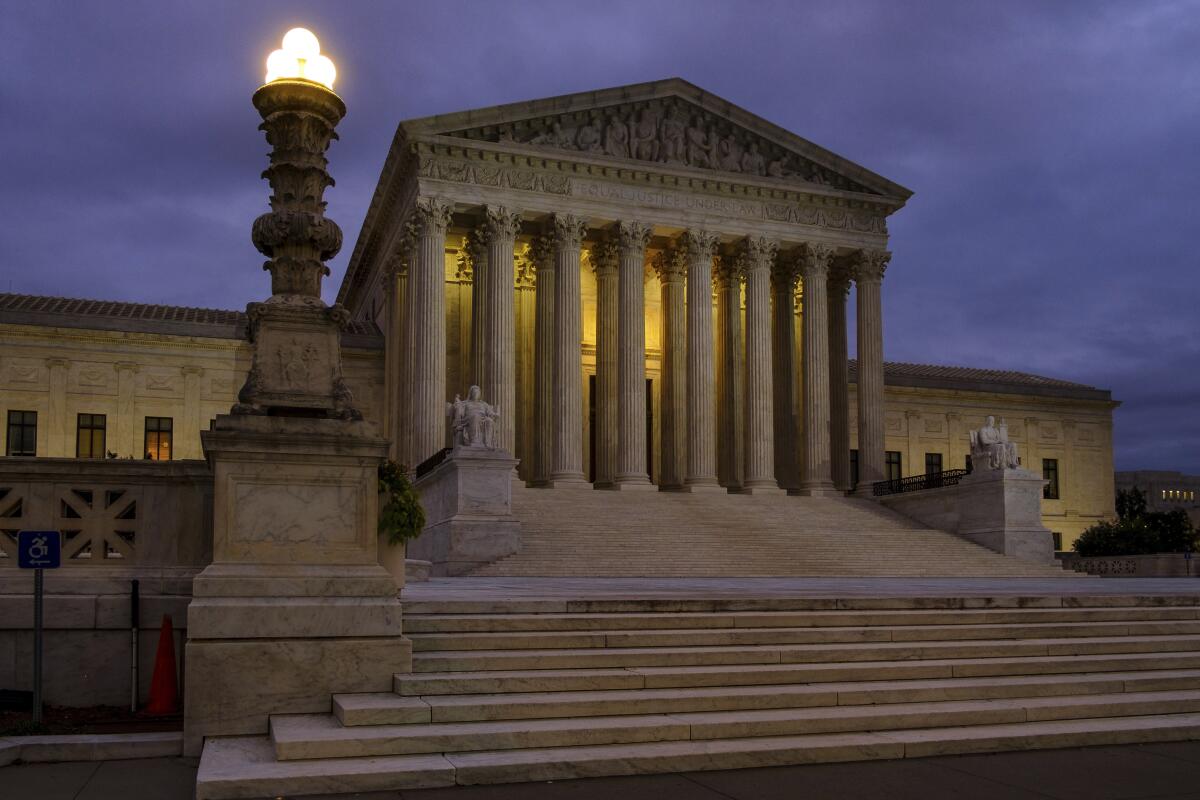Supreme Court denies due process rights for some asylum seekers

- Share via
The right to due process for some asylum seekers took a beating in the U.S. Supreme Court on Thursday.
In early 2017, a Sri Lankan farmer and political activist named Vijayakumar Thuraissigiam slipped across the U.S.-Mexico border near San Ysidro and was detained almost immediately by a Border Patrol agent. Thuraissigiam said he had fled Sri Lanka after being severely beaten by unidentified men because of his political support for a Tamil candidate, and he feared being targeted if he returned. The agent rejected the asylum claim because Thuraissigiam could not identify the men or their motive in beating him, nor had he claimed that the Sri Lankan government would not protect him against future attacks.
An asylum officer agreed that Thuraissigiam did not meet the “credible fear” threshold for asylum, and an immigration judge, after looking at the case, concurred. Thuraissigiam sought to appeal to the federal courts — and was refused.
Erring on the side of leniency isn’t suspicious if it’s done evenhandedly
By a 7-2 vote, the Supreme Court agreed that Thuraissigiam was not entitled to a federal court review of those administrative decisions, a ruling that could affect thousands of asylum seekers at a time when the Trump administration is severely curtailing who may apply for asylum and how they may do it. And those efforts were underway well before the coronavirus outbreak led the president to effectively shut the border to nonessential traffic.
There are practical arguments — including fear of overloading the federal court system — for making it harder to game the asylum process and delay rightful deportations, but denying people the right to have a federal court review the government’s decision is not the way to do it. And the cost of denying people due process rights is magnified under an administration that has pushed policies across the board that, at a minimum, stretch its legal authority, restrained only by activists who intervene with lawsuits.
The administration ordered Thuraissigiam’s expedited removal under the provisions of a 1996 federal immigration law. The 9th Circuit Court of Appeals held that the law was unconstitutional because it violated asylum seekers’ right to due process, but the Supreme Court disagreed.
Writing for the majority, Justice Samuel A. Alito Jr. said that while people who have established connections in the United States have due process rights in deportation proceedings, “the court long ago held that Congress is entitled to set the conditions for an alien’s lawful entry into this country and that, as a result, an alien at the threshold of initial entry cannot claim any greater rights under the Due Process Clause.”
So, in essence, the right to judicial review of governmental action doesn’t exist for people like Thuraissigiam who believe the government has prevented them from pursuing another right that Congress has granted — the right to seek asylum. Justice Sonia Sotomayor, in a dissent joined only by Justice Elena Kagan, got the core issue correct.
“Today’s decision handcuffs the judiciary’s ability to perform its constitutional duty to safeguard individual liberty and dismantles a critical component of the separation of powers,” she wrote. “It increases the risk of erroneous immigration decisions that contravene governing statutes and treaties.”
And it grants far too much power to an immigration review system that has been increasingly politicized under the Trump administration. While the Department of Homeland Security oversees border control and the credible-fear review process that is the first step in seeking asylum, the immigration courts are part of the Department of Justice, which over the last three years has sought to align administrative law decision with the president’s anti-immigrant and anti-asylum political views, often contravening years of immigration court precedent. This is the scenario in which review by an independent federal court is absolutely necessary to help guard against administrative excess.
Meanwhile, the lives of the desperate hang in the balance. Does Thuraissigiam deserve asylum protections? That’s a matter of debate. But he — and other asylum seekers — certainly deserves to have access to federal courts to ensure that life-and-death immigration decisions are reached fairly, and that our core right to due process protections cannot be signed away by an act of Congress.
The court’s decision spotlights yet again how absolutely crucial it is for Congress to overhaul the nation’s outdated and insufficient immigration laws — including those governing asylum — to reflect the nation’s best interests and the promises embedded in the Constitution.
More to Read
A cure for the common opinion
Get thought-provoking perspectives with our weekly newsletter.
You may occasionally receive promotional content from the Los Angeles Times.










